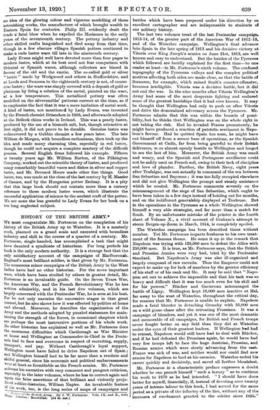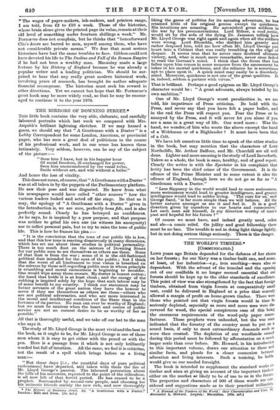HISTORY OF THE BRITISH ARMY.*
Ws meat congratulate Mr. Fortesoue on the completion of his history of the British Army up to Waterloo. It is a masterly work, planned on a grand scale and executed with boundless industry and skill in the course of a quarter of a century. Mr. Fortescue, single-handed, has acoomplished a task that might have daunted a syndicate of historians. For long periods his book is the only modern authority. It is a strange feat that the only satisfactory account of the campaigns of Marlbormush. England's most brilliant soldier, is that given by Mr. Fortescue. The numerous minor campaigns of the British Army in the West Indies have had no other historian. For the more important wars, which have been studied by others in greater detail, Mr. Fortescue is an invaluable guide. On the Seven Years War, the American War, and the French Revolutionary War he has written admirably, and in his last five volumes, which are largely concerned with the Peninsular War, he is seen at his beet. For he not only narrates the successive stages in that great contest, but he also shows how it was affected by politics at home and abroad. Moreover, he describes the organization of the Army and the methods adopted by puzzled statesmen for main- taining the strength of the forces, in occasional chapters which are perhaps the most instructive portions of his whole work. No other historian has explained so well as Mr. Fortescue does the enormous difficulties which Castlereagh as War Minister at home and Wellington as Commander-in-Chief in the Penin- sula had to face and overcome in respect of recruiting, supply, transport, and pay. Without Castlereagh's loyal support, Wellington must have failed to drive Napoleon out of Spain ; arid Wellington himself had to be far more than a resolute and skilful general, since his economic and political embarrassments were at least as formidable as the French armies. Mr. Fortescue eilivens his narrative with racy comment and pungent criticism, especially in the later volumes, where he has to correct again and siatin the false assertions of that brilliant and violently preju- diced soldier-historian, William Napier. An invaluable feature
is work, too, is the long series of maps of campaigns and
!aoiLtss lifsh drrny. By J. W. Fortoseue. Vols. 111.. and with 1£4 45. net.]
battles which have been prepared under his direction by an excellent cartographer and are indispensable to students of our military history.
The last two volumes treat of the last Peninsular campaign. 1813-14, of the greater part of the American War of 1812-15, and of the Waterloo campaign. Wellington's final advance Into Spain in the late spring of 1813 and his decisive victory at Vitoria over King Joseph's armies on June 21st, 1813, are well known and easy to understand. But the battles of the Pyrenees which followed are lucidly explained for the first time—to one reader at least—in Mr. Forteseue's ninth volume. The confused topography of the Pyrenean valleys and the complex political motives affecting both sides are made clear, so that the battle of Sorauren, for example, which ruined Soult's counter-offensive, becomes intelligible. Vitoria was a decisive battle, but it did not end the war. In the nine months after Vitoria Wellington's Army had some of the most desperate fighting and endured some of the greatest hardships that it had over known. It may be thought that Wellington had only to push on after Vitoria and drive the demoralized adversary across the Pyrenees. Mr. Fortescue admits that this was within the bounds of posai- bility, but he thinks that Wellington was on the whole right in not taking the risk. Had he invaded Franoe prematurely, he might have produced a reaction of patriotic sentiment in Napo- 1eon's favour. Had he quitted Spain too soon, he might have cut himself off from a secure base of operations, as the Spanish Government at Cadiz, far from being grateful to their British deliverers, were almost openly hostile to Wellington and longed to see the last of him. Moreover, the British Army was small and weary, and the Spanish and Portuguese auxiliaries could not be safely used on French soil, owing to their lack of discipline and love of plunder. Further, the British Navy, eight years after Trafalgar, was not actually in command of the sea between San Sebastian and Bayonne ; it was too fully occupied elsewhere and did not give Wellington the prompt and steady assistance which he needed. Mr. Fortescue comments severely on the mismanagement of the siege of San Sebastian, which ought to have been taken in a few days instead of holding out for months, and on the indifferent generalship displayed at Toulouse. But In the operations in the Pyrenees as a whole Wellington showed himself a very able strategist, and far more than a match for Soult. By an unfortunate mistake of the printer in the fourth sheet of Volume X., a vivid account of Graham's attempt to storm Bergen-op-Zoom in March, 1814, is completely spoiled.
The Waterloo campaign has been described times without number. Yet Mr. Fortescue imparts freshness to his own treat- ment of the famous theme. He sums it up in the remark that Napoleon was trying with 125,000 men to defeat the Allies with 250,000 men. It is true, as Mr. Fortescue says, that the British and Prussian Armies were very bad, tried by the Peninsular standard. But Napoleon's Army was also ill-organized and largely composed of raw recruits. Thus the Emperor could not expect to make up for lack of numbers by the greater efficiency of his staff or of his rank and file. It may be said that " Napo- leon set out to achieve the impossible and that his task was so heavy and difficult that it was too much even for his skill and for his powers." Blucher and Gneisenau mismanaged the battle of Ligny. Wellington kept 16,000 men inactive at Hal, far away to the west of Waterloo, throughout the critical day, for reasons that Mr. Fortescue is unable to explain. Napoleon made a fatal blunder in detaching Grouchy with 35,000 men on a wild goose chase after the retreating Prussians. It was a campaign of blunders, and yet it was one of the most dramatic and memorable of all campaigns, for British and French troops never fought better on any field than they did at Waterloo under the eyes of their greatest leaders. If Wellington Issd had to retreat, Napoleon would still have had to deal with Blucher, and if he had defeated the Prussians again, he would have had very few troops left to face the huge Austrian, Prussian, and Russian armies which were slowly advancing from the east- France was sick of war, and neither would nor could find new armies for Napoleon to hurl at his enemies. Waterloo ended his career quickly and decisively, and saved all further bloodshed.
Mr. Fortescue in a characteristic preface expresses a doubt whether he can permit himself "such a luxury" as to continue his work to 1870 as he had intended. "1 should have done better for myself, financially, if, instead of devoting over twenty years of intense labour to this book, I had served for the same period as a private of the infantry of the line, without any of the increases of emolument granted to the soldier since 1895."
"The wages of paper-makers, ink-makers, and printers range, I am told, from £3 to £10 a week. Those of the historian, whose brain alone gives thoprinted page its value, remain at their old level of something under fourteen shillings a week." Mr. Portman° does not complain, but he thinks that "henceforward Clio's doors are barred to men, myself among them, who have not considerable private means." We fear that most serious historians have had the same troubles to face. Gibbon could not have devoted his life to The Decline and Fall of the Roman Empire if he had not been a wealthy man. Macaulay made a large fortune by his Ifietory of England because he was already a popular writer and a leading politician. We should be sur- prised to hear that any really great modern historical work, involving years of research, has brought its author adequate financial recompense. The historian must seek his reward in other directions. Yet we cannot but hope that Mr. Forteseue's great book may be more widely read, so that he may be encour- aged to continue it to the year 1870.







































 Previous page
Previous page